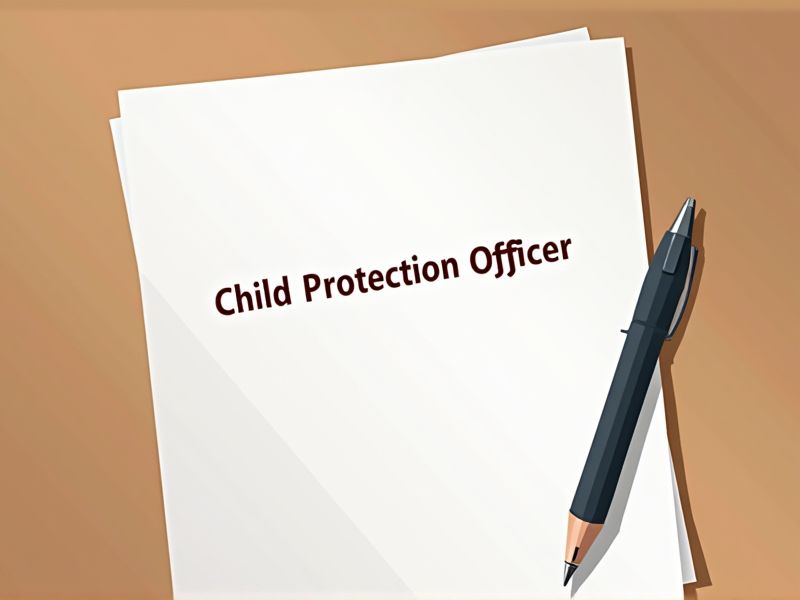
Child Protection Officers play a critical role in safeguarding the well-being and safety of children. Certification ensures that these professionals possess the necessary knowledge in legal, ethical, and psychological aspects pertinent to child welfare. Proper credentials foster trust and credibility with both colleagues and the families they serve. Some key certifications required for Child Protection Officers are highlighted below.
Certified Child Protection Professional (CCPP)
The CCPP designation ensures that Child Protection Officers have the necessary training and expertise to effectively safeguard children from harm and abuse. By obtaining CCPP certification, officers can demonstrate their commitment to maintaining the highest standards in child protection practices. This certification provides a standardized framework that aids in the identification and management of risks faced by children. The presence of certified professionals in this field enhances public trust and ensures better cooperation with other agencies involved in child welfare.
Child Abuse Recognition and Reporting Certification
Child Abuse Recognition and Reporting Certification equips Child Protection Officers with vital skills to identify signs of abuse, enhancing early intervention. Training in recognition and reporting ensures compliance with legal mandates, safeguarding both the officer and the institution. Accurate identification and prompt reporting foster collaboration with agencies that provide necessary support to at-risk children. Comprehensive certification promotes a standardized approach, ensuring consistent protection efforts across different regions.
Mandated Reporter Training Certification
Mandated Reporter Training Certification equips Child Protection Officers with the necessary skills to identify and report signs of child abuse and neglect effectively. This specialized training ensures consistent compliance with legal obligations and helps prevent potential harm to children by facilitating timely intervention. By being certified, officers demonstrate a standardized level of knowledge, which enhances trust and accountability in child protection systems. Certified training also supports the creation of a safe environment for children as it empowers officers with the confidence to perform their duties with competence.
Trauma-Informed Care Certification
Trauma-Informed Care Certification equips Child Protection Officers with the necessary skills to recognize and respond to trauma in children's lives. Recognizing trauma can improve the officer's ability to create supportive and healing environments, reducing retraumatization and enhancing recovery outcomes. Understanding the nuances of trauma helps in tailoring interventions that align with each child's unique experiences and needs. Enhanced knowledge through certification promotes better communication and trust-building with children, fostering more effective protective measures.
Child Welfare Certification
Child Welfare Certification ensures that a Child Protection Officer possesses the necessary knowledge and skills to address complex child welfare issues effectively. Proper certification leads to better outcomes for children by enabling officers to identify abuse and neglect signs accurately. It establishes a consistent standard across different jurisdictions, which facilitates cohesive inter-agency communication and coordination. Trained officers are more adept at implementing evidence-based interventions, ultimately reducing instances of re-victimization and improving children's overall well-being.
Child Sexual Abuse Prevention Certification
Child Sexual Abuse Prevention Certification equips Child Protection Officers with the necessary knowledge to identify signs of abuse, enabling early intervention. This certification enhances their ability to implement effective prevention strategies, reducing the risk of future incidents. Thorough understanding of legal protocols gained through certification ensures officers handle cases appropriately and ethically. Certification fosters trust within communities, encouraging more reporting and collaboration in preventing child abuse.
Crisis Intervention Certification
Crisis intervention certification equips Child Protection Officers with the necessary skills to respond effectively to emergencies involving children. This specialized training enhances their ability to de-escalate potentially volatile situations, ensuring the safety of children and their families. With certification, officers can better recognize signs of trauma, offering appropriate support and referrals for further assistance. This expertise is crucial in legal scenarios where trained responses impact case outcomes and ongoing child welfare.
Family Support Specialist Certification
Family Support Specialist Certification equips a Child Protection Officer with critical skills in communication and conflict resolution, enhancing their ability to engage effectively with families. This certification ensures officers are familiar with trauma-informed care approaches, which is crucial for interacting sensitively with children who have experienced abuse or neglect. Child Protection Officers with this certification are better prepared to facilitate family reunification efforts, adhering to legal and best-practice standards. Data shows that certified officers are more successful in achieving positive family outcomes, leading to increased stability and safety within households.
Domestic Violence and Child Abuse Intervention Certification
Domestic violence and child abuse intervention certification equips a Child Protection Officer with specialized knowledge to identify and assess risk factors effectively. This certification enhances their capacity to implement evidence-based intervention strategies, promoting safer environments for children. Understanding the legal frameworks and ethical practices associated with these issues ensures officers can navigate complex situations adeptly. Proper training can improve inter-agency collaboration, fostering more comprehensive protection plans for vulnerable children.
Pediatric First Aid/CPR Certification
Pediatric First Aid/CPR Certification equips a Child Protection Officer with the skills to promptly respond to medical emergencies involving children, which increases their chances of recovery. Understanding life-saving techniques reduces the risk of long-term injury or fatalities in various situations. Trust and confidence bolster when parents and guardians know that officials are prepared to handle health crises effectively. Certification ensures compliance with child safety regulations and standards, enhancing the credibility and professionalism of the child protection agency.
Summary
By obtaining certifications, you enhance your trust in the competence of Child Protection Officers. This credibility leads to better compliance with child protection policies. The community will likely observe improved child safety outcomes and increased reporting of incidents. As certified officers bring advanced skills and knowledge, they efficiently address complex cases, fostering a safer environment for children.
